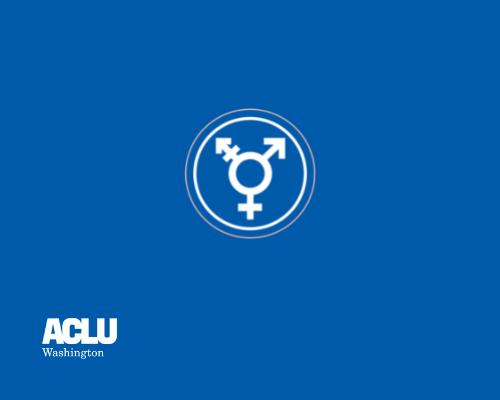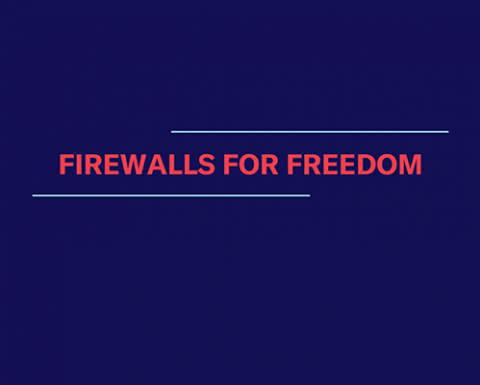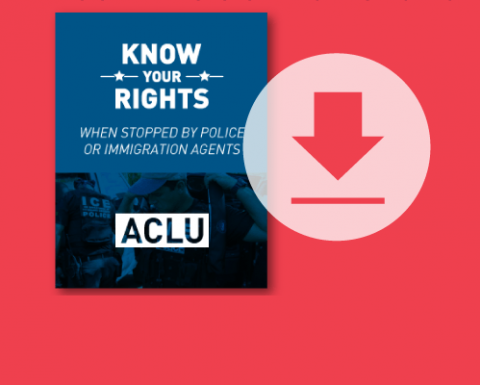
It is not meant to provide legal advice.
The law in this area changes frequently. This guide is current as of May 2025.
DISCRIMINATION & HARASSMENT
Are there laws that prohibit discrimination against transgender people?
Yes. State and federal laws prohibit discrimination against transgender people in many circumstances.How does Washington law prohibit discrimination against transgender people?
Our state anti-discrimination law, known as the Washington Law Against Discrimination (WLAD), explicitly prohibits discrimination because of “gender expression or identity,”[1] including actual or perceived identity.
This protection includes, but is not limited to, protection from discrimination in the following areas:
-
Places of public accommodation (i.e., places that serve the public), including restaurants, hotels, and public schools;[2]
- Housing, including the renting, buying, and selling of homes;[3]
- Employment, specifically in state, municipal, and private workplaces with eight or more employees;[4]
- Credit transactions, including loans and credit cards;[5] and
- Insurance transactions, including health insurance.[6]
- Violence and threats motivated by gender expression or actual or
- perceived gender identity,[7] and
- Student-on-student harassment, intimidation, and bullying motivated by gender expression or actual or perceived gender identity in public schools.[8]
Some cities (Burien,[9] Olympia,[10] Seattle,[11] and Tacoma[12]) and one county (King[13]) have also passed local laws prohibiting discrimination based on gender identity and expression.
Hate crimes: Washington state law states that a person may be guilty of a hate crime if they intentionally and maliciously commit an act because of their perception of the person's gender expression or identity.[14] Acts include intentionally and maliciously assaulting another person, causing physical damage to property of another person, or threatening a specific person or group of people such that it makes them afraid of harm to themselves or property.[15] A victim of a hate crime may also file a civil action against the person who committed the offense. That person may be liable for actual and punitive damages up to $100,000 and reasonable costs and fees.[16]
What does “gender expression or identity” mean under the law in Washington?
As defined under WLAD, “gender expression or identity” means “having or being perceived as having a gender identity, self-image, appearance, behavior, or expression, whether or not that gender identity, self-image, appearance, behavior, or expression is different from that traditionally associated with the sex assigned to that person at birth.”[17] Under this definition, transgender individuals are protected by WLAD from discrimination based on their transgender status.[18]
|
How does federal law prohibit discrimination against transgender people?
Employment: Title VII prohibits discrimination based on sex in employment. In 2020, the U.S. Supreme Court ruled that Title VII prohibits discrimination based on gender identity and sexual orientation.[19]
Does the U.S. Constitution protect transgender people from discrimination?
Yes. While federal laws (Title VII discussed above) include protections for transgender people, there are also protections under the 14th Amendment of the U.S. Constitution. Federal courts have recognized that discrimination on the basis of transgender identity violates the Equal Protection Clause of the Fourteenth Amendment,[20] because sex discrimination encompasses discrimination on the basis of gender identity or expression. In 2020, the Fourth Circuit recognized that the Fourteenth Amendment protects transgender students from discriminatory bathroom policies.[21]
In addition, the First Amendment, which bars the government from censoring speech or expression, protects people’s right to dress (an important form of personal expression) in a way that is consistent with their gender identity. Furthermore, the Due Process Clause likely recognizes and protects individuals’ interests in determining and expressing their gender through personal appearance and mannerisms.
Does the law protect a transgender person’s right to use the restroom consistent with their gender identity?
Yes. WLAD specifically protects against discrimination in employment and places of public accommodation, including public schools, based on one’s gender expression or identity.[22] The Washington State Human Rights Commission (HRC) — the state agency responsible for enforcing the WLAD — issued regulations in 2015 clarifying that the WLAD protects the right of transgender individuals to use restrooms and other gender-segregated facilities consistent with their gender identity.[23]
The Washington state Office of Superintendent of Public Instruction (OSPI) also issued guidelines to school districts recognizing the rights of transgender students to use restrooms consistent with gender identity. These guidelines, which relate to the elimination of discrimination in public schools, state that school districts should allow students to use the restrooms “consistent with their gender identity consistently asserted at school.”[24] The guidelines also state that any student who has a need or desire for increased privacy should be provided access to an alternative restroom, such as a staff or health office restroom, but that no student should be required to use a private restroom or a restroom inconsistent with their gender identity just because they are transgender or gender nonconforming.[25]
Are there laws that specifically protect transgender students from harassment?
Yes. Washington law protects transgender students in public schools from discrimination, intimidation, bullying, and harassment.[26] Additionally, the WLAD and the Office of Superintendent of Public Instruction (OSPI) require public school officials to allow transgender students to wear clothing that matches their gender identity (including at proms),[27] call transgender students by the student’s chosen name and pronoun,[28] provide transgender students with access to safe and appropriate restrooms and locker rooms (or appropriate alternative places in which to change for gym class) and accommodate transgender athletes.[29] For transgender students participating in interscholastic athletics in public schools, OSPI regulations direct school districts to follow the policies of the Washington Interscholastic Activities Association (WIAA), which state that students should be allowed to participate in physical education and athletic activities in a manner that is consistent with their gender identity.[30]
|
ACLU OF WASHINGTON
The American Civil Liberties Union of Washington is a nonprofit, nonpartisan membership organization devoted to protecting the civil liberties of all people in Washington and extending rights to groups that historically have been denied equal treatment.
As one of the ACLU’s more than 50 local affiliates around the U.S., the ACLU of Washington works for equal rights and legal protections against discrimination and harassment for the LGBTQIA2S+ community through litigation and legal advocacy, lobbying at the state legislature and local governments, and public education. The ACLU of Washington does not address problems that arise outside of the state of Washington.
The ACLU of Washington offers information in response to specific inquiries or concerns and suggestions on how to assert individual rights and engage in advocacy; provides referrals to other organizations better able to offer such information or advice in specific situations; and in some instances, undertakes impact litigation (i.e., pursues lawsuits that will defend or extend fundamental civil liberties and civil rights that will affect a large number of people).
If you feel you have been the victim of discrimination based on your gender expression or identity, please consider contacting the ACLU of Washington in one of the following ways:
- Online: Submit a request for help online by visiting www.aclu-wa.org/help
- By phone: Call the ACLU of Washington’s Information and Referral Program at 206.624.2180 (open Tuesday through Thursday, 10:00 a.m. to 1:00 p.m.).
-
By mail: Write to American Civil Liberties Union of Washington, P.O. Box 2728, Seattle, WA 98111 and provide the following information: your name, mailing address, telephone number and e-mail address (if available); a brief description of the problem or issue about which you are contacting the ACLU of Washington, including any relevant dates and the names of any individuals or organizations involved; a description or copy of any relevant documentation; whether you are presently represented by an attorney in the matter you are writing about; whether you have taken any steps to resolve the matter you are writing about and, if so, a description of these steps; and a description of what you would like the ACLU of Washington to do concerning this matter.
ADDITIONAL RESOURCES
For additional resources and information about transgender rights, please see:- Gender Justice League (www.genderjusticeleague.org)
- QLaw Foundation (https://www.qlawfoundation.org)
- Lavender Rights Project (https://www.lavenderrightsproject.org)
- Ingersoll Gender Center (www.ingersollgendercenter.org)
- Washington State Human Rights Commission (www.hum.wa.gov)
- Office of the Corrections Ombuds (OCO) (https://oco.wa.gov/)
- King County Ombuds Office (www.kingcounty.gov/independent/ombuds.aspx)
(parks), https://library.municode.com/wa/seattle/codes/municipal_code.




